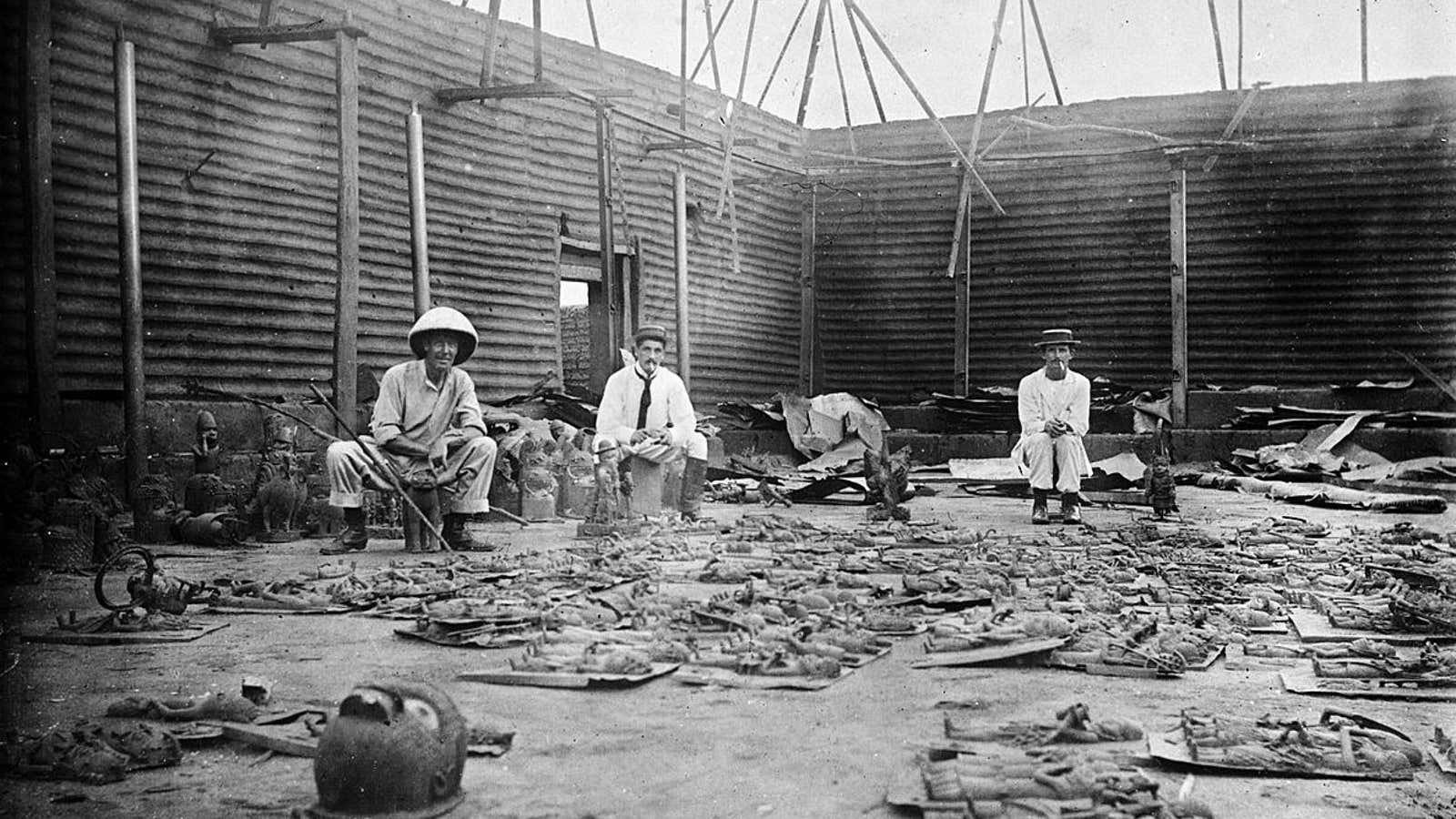Dakar, Senegal
It has taken a generational change to finally face the question of returning looted artifacts to former European colonies. French president Emmanuel Macron, speaking to university students in Burkina Faso last year, presented himself as a politician “from a generation which, like you, has never known Africa as a colonized continent.”
Macron also said returning African art to the continent is a “top priority”of his administration. “I cannot accept that a large part of cultural heritage from several African countries is in France, African heritage can’t just be in European private collections and museums,” he said. He’s given his administration five years. The main force behind this push has been Patrice Talon, Benin’s president, who has been promoting African culture and identity through new museum buildings. He’s also been pushing for the looted Dahomey treasures to be brought back to his country.
But returning loot isn’t as straightforward as it sounds. France has established a commission, led by French art historian Benedicte Savoy and Senegalese economist and writer Felwine Sarr, along with other artists, activists, collectors and experts from Africa and Europe. In a press conference at Dakar’s Musée Theodore Monod- Senegal’s main collection of traditional African art – it laid down how the project is moving forward.
The first step has been to look up the official inventories to establish what is in French national museums that rightfully belongs to Africa.
“We have to start setting out the conditions for restitution,” said Savoy “and determine what this actually means: not only what should be handed back, but also how do we re-contextualize objects that have been in a different setting for so long?” she said.
For Senegal, the commission has found 5,142 objects currently in France’s Quai Branly-Jacques Chirac Museum, a museum for indigenous art from Africa, Oceania, Asia and the Americas, which also owns the Benin’s treasures. Of these, about 2,000 are photos and pieces of pottery, then there are fishermen’s nets, as well as statues, masks, and textiles. These objects have become part of a diaspora, according to Felwine Sarr, and what arrived in France as loot and as regular purchase is currently mixed: “however, we have to understand the degree of asymmetry in these purchases, and how exactly they took place,” he said. “Not everything was illicit, or the product of a military and archeological colonial enterprise.”
For now, the commission plans to partially model its work on what has been done to return items stolen from Jewish families and collectors in Nazi Germany.
Something at last is changing, says Marie-France Fauvet, archaeologist: “After the restitution by France of 20 mummified Maori heads to New Zealand public opinion has had a more emotional response,” which has managed to bring home the importance of this cultural heritage.
Part of the reluctance to hand back stolen artefacts has been justified by citing the state of African museums “which are definitely not the only ones where something wrong may happen,” counters Malick Ndiaye, director of Dakar’s Museum IFAN.
And on the opposite side of the coin, is how some objects are unreadable out of their contexts: among the Senegalese artifacts in French hands are a number of old fishnets, that art historians have so far deemed of little value: “the knots in Senegalese fishnets represent ancient mathematical codes. They are in fact a very valuable part of our technological heritage,” said Ndiaye.
Ndiaye welcomes the French president’s initiative: “Macron has taken a political decision,” he said, “but he has done so in a fresh way, trying to restore justice,” he said. Benedicte Savoy called it “the end of arrogance.”
France’s initiative comes alongside a renewed debate in European museums, from London to Berlin: through the Benin Dialogue Group, a museum consortium created in 2007. Plans are moving ahead to establish a permanent loan to Nigeria’s Benin city of the looted Benin Kingdom bronzes, that were taken by invading British troops in 1897. In Germany, the Humboldt Forum, due to open in 2019, is already being rocked by controversies linked to the need for addressing ill-acquired African artifacts.
